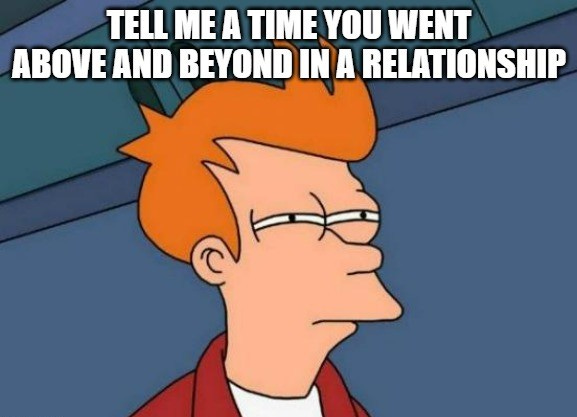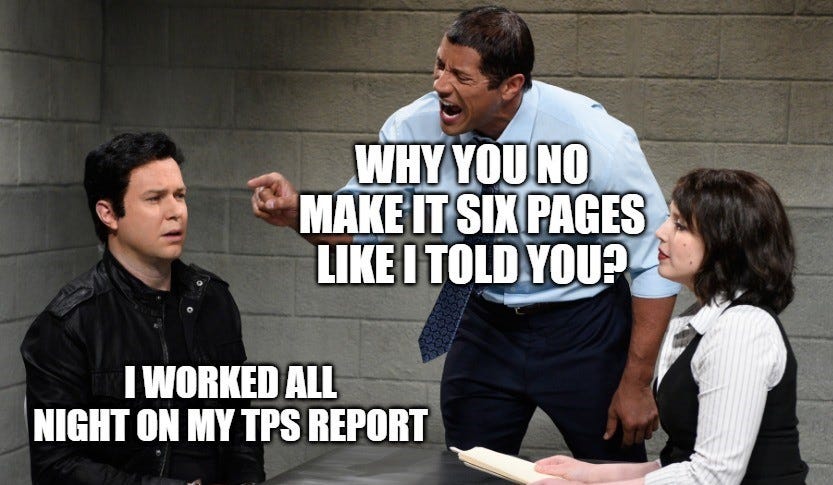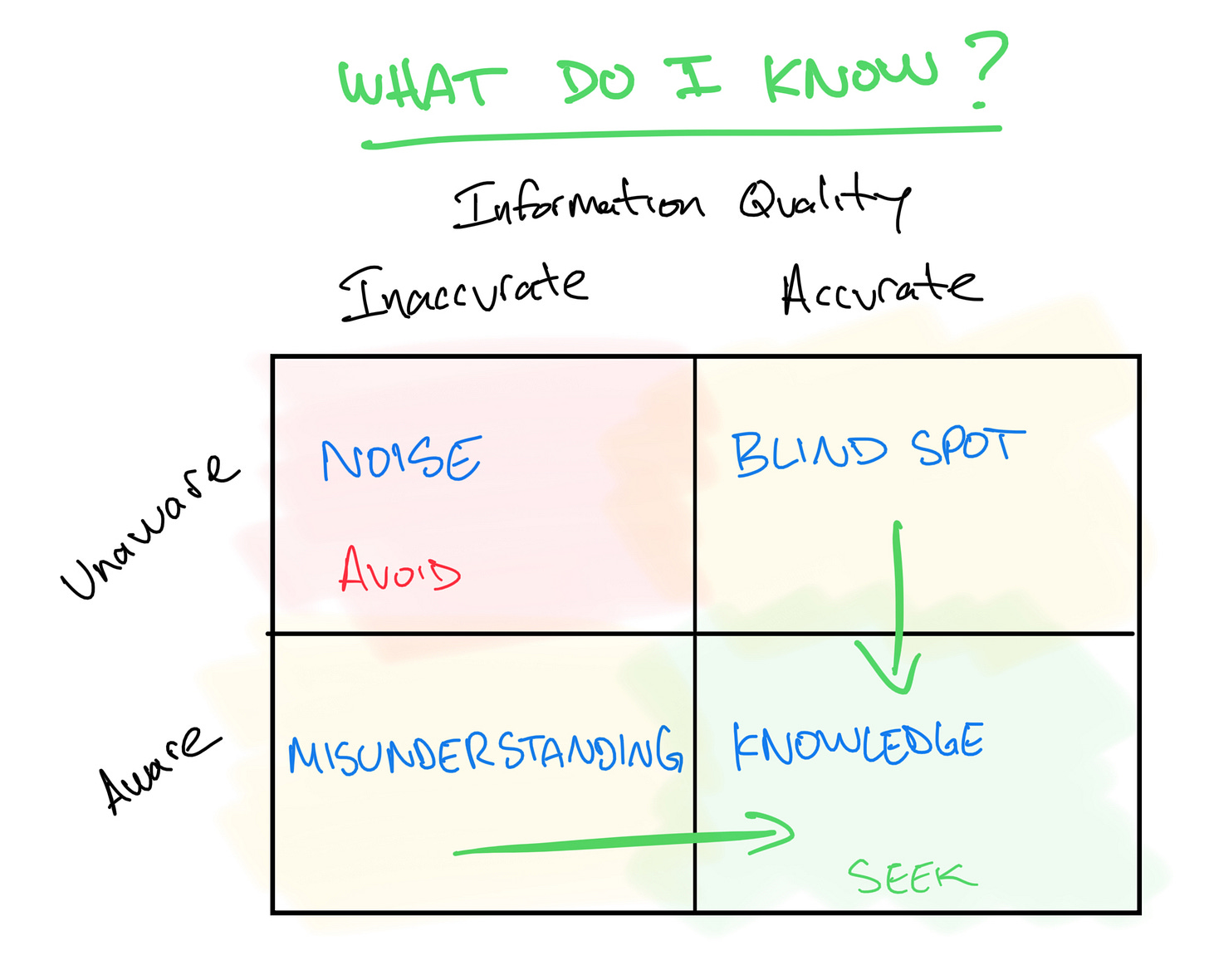"Where do you see yourself in 5 years?"
"What would your ideal job be?"
As I asked the questions, I could see her mind racing to construct an answer. Eyes widening slightly, her face flashed a twinge of anxiety. She cleared her throat and responded.
I listened and nodded. I analyzed the answer. I thought about what to follow up with next.
It was then I realized I was careening towards catastrophe.
This wasn't a job interview.
It was a date.
I have a tendency to ask questions. Fortunately, I've learned the error in my ways. I now approach questions in a much more context appropriate manner.
I’ve been praised, scolded, admired, loathed for asking questions. I think a reason for this range of responses is that we don’t encounter questions enough in our lives.
Questions are uncomfortable. We feel uncomfortable or insecure to ask, for fear of offense or of looking foolish. We feel threatened and anxious when asked, as we question motives of the asker.
But good questions help us understand, to get to truth, to make better decisions. Asking questions is a skill we overlook.
For this post, I outline how we can use questions to probe our ideas and understanding. We can use questions to test our thinking and ideas to help make better decisions in life and work.
First, let’s touch on when questions are bad.
Bad questions are too common
Bad questions cripple collaboration. They embitter us.
Bad questions are those that are asked for the purpose of demonstrating superiority (see post on our desire to win). Often paired with an aggressive or patronizing tone, bad questions can be used to embarrass, accuse, or to “prove a point.”
Good questions are those rooted in curiosity to know, to understand, to get to the best outcome.
It’s surprising how easily we can slip into the behavior of bad questions. If we note our motivations with our questions, we can seek to stop ourselves when our bad questions arise. If presented with bad questions, we can respond with curiosity. Curiosity helps us understand where the question is coming from and treats our conversation partner as a collaborator.
Questions to probe and understand
We ingest some information from the world. We make sense of it and we act accordingly. It’s pretty straightforward.
If we had perfect information and faultless brains this would be great. But we don’t. So we often have to explore further with what we’re presented and with what we know. Good questions can help both us and our conversation partners clarify our thinking and get to better outcomes.
Here are two ways to probe further:
1) Correct misunderstandings
We can have information and perspective, but what we know may be inaccurate in our understanding. For example, this could occur when we initially learn new things. The danger with misunderstandings is we may be unable to act due to our lack of understanding. Or worse, we act on inaccurate or suboptimal understanding and information.
Sample questions to ask in this case:
How could I (we) be wrong in my (our) understanding?
Are we thinking correctly for our desired outcome?
Is what I (we) know accurate?
2) Uncover blind spots
There will be information that is valuable to know, but we’re unaware we needed to know it. Questions can help spur thinking that uncovers blind spots to address.
Some questions to ask in this case:
What could I (we) be missing?
What else needs to be true for this to be true?
Are there second order effects to consider?
Our goal is to move to a place where we have awareness and accuracy in our understanding - we are knowledgeable.
Surprisingly, our brain likes to trick us when we don’t have knowledge.
The danger of misunderstanding and blind spots
When humans don’t understand, we make up stories. Our brains do not like misunderstandings or gaps in our knowledge. Rather than seek out truth, we gravitate to or invent reasoning to satisfy our need to make sense of the world. Rather than understand why my date was catastrophic, I invent a story about how my date was not cerebral enough, nor focused, nor polite, humorous, and fashionable enough to sufficiently answer my questions (yeah right..). We end up with the illusion of knowledge.
We need to be aware of this fallacy and use our curiosity and probing questions to guide us to true knowledge.
“We can’t live in a state of perpetual doubt. So we make up the best story possible and we live as if this story were true.” - Daniel Kahneman
How do we ask better questions?
The main components to better questions is embrace curiosity and humility.
Curiosity in our understanding
If we have a true desire to know, we listen, we process, and we seek to understand. Curiosity leads us to identify what we might not know. We ask follow up questions. We move from vague to specific questions.
Humility in our action
With humility, we: 1) Respect others for what they may know, 2) Acknowledge our own limits. Humility holds us back from trying to prove we're right. It opens us up to respect others and to listen to them. Humility enables us to admit we might be wrong or we might not know something.
President Obama is an example of a questioning style that incorporates curiosity and humility. Jim Comey, former FBI director, describes Obama:
“He was an extraordinary listener, as good as any I’ve seen in leadership. I watched him work hard to draw as many viewpoints as possible into a conversation, frequently disregarding the hierarchy reflected in seating arrangements”
“He was carefully tracking what they said, something he would prove by asking questions when they finished; the questions were often drawn from throughout the minutes he had been listening.”1
Together, curiosity and humility enable us to separate people from ideas. We can challenge ideas and understanding, not people. We can see fault in our own ideas and understanding, and not with ourselves.
How to have more comfort being asked questions
It can be uncomfortable to be on the receiving end of questions. We can adopt some perspectives to help us embrace questions asked to us.
Trust with good intent
If we trust that questions are not an attack on us, but a means to seek the best outcomes, we can alleviate our discomfort. However, if we do suspect that bad questions are posed to us, we can respond with curiosity first and redirect as needed.
Acknowledge our value
People seek our knowledge or opinion when we have something of value to add. Answering questions is a way to share our thoughts. When questions are posed to us, it’s an acknowledgement of what we know.
..And therefore what?
If we can see the benefit of truth and knowledge, we can build our courage towards asking more questions and welcoming more questions.
If we underscore with curiosity and humility, we can move in a collaborative fashion towards truth and knowledge.
With collaborative conversations, we can even enter a realm where conversations are stimulating and delightful.
Sounds like something even those of us awkward in social situations can benefit from.
Jim Comey, “A Higher Loyalty”





